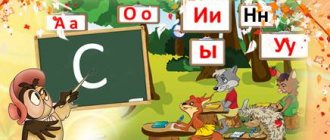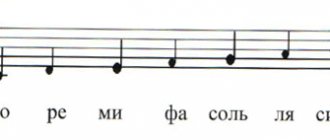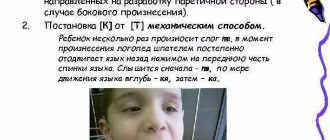Consonants with several reading types
In English, the same letter can make different sounds depending on the letters surrounding it.
| Letter | Transcription | Position | Example |
| C | [s] - with | before vowels e, i, y | city ['sɪt.i] city ice [aɪs] ice |
| WITH | [tʃ] - h | in combinations ch, tch | children ['tʃɪl.drən] children catch [kætʃ] to catch |
| C | [k] - to | in other cases | cat [kæt] cat picnic ['pɪk.nɪk] picnic |
| S | [z] - z | at the end of words after vowels and voiced consonants | places [pleɪsɪz] places dogs [dɑ:ɡz] dogs |
| S | [s] - with | starting position, precedes a voiceless consonant, the final position follows after a voiceless consonant | six [sɪks] six sun [sʌn] sun fast [fæst] quickly |
| S | [ʃ] - sh | in combination sh | she [ʃi:] she show [ʃoʊ] show |
| G | [g] - g | precedes any consonant vowels a, o, u, final position | gun [gʌn] pistol goose [gu:s] goose garlic ['gɑ:lɪk] garlic |
| G | [dʒ] - j | precedes vowels e, i, y | page [peɪdʒ] page energy [enərdʒi] energy |
| X | [gz] - gz | before a stressed vowel | exam [ɪɡ'zæm] exam exact [ɪɡ'zækt] exact |
| X | [ks] - ks | at the end of words, before a consonant, before an unstressed vowel | next [next] next six [sɪks] six text [text] text |
Read also
25 interesting English phraseological units
Consonants with one type of reading
| Letter | Transcription | Example |
| B | — b | big [bɪɡ] bigbad [bæd] badboy [bɔɪ] boy |
| D | [d] - d | do [du:] do doctor ['dɑ:ktər] doctor end [end] end under ['ʌndər] under |
| F | [f] - f | fish [fɪʃ] fish fox [fɑ:ks] fox after ['æftər] after safe [seɪf] safe |
| J | [dʒ] - j | job [dʒɑ:b] work just [dʒʌst] just joke [dʒoʊk] joke |
| K | [k] - to | kind [kaɪnd] kind king [kɪŋ] king kitten ['kɪtən] kitten |
| L | [l] - l | look [lʊk] look sale [seɪl] sale ball [bɑ:l] ball |
| M | [m] - m | make [meɪk] doswim [swɪm] swimmilk [mɪlk] milk |
| P | - p (read aspirated) | pie [paɪ] pieopen ['oʊ.pən] openpony ['poʊ.ni] pony |
| R | [r] - p | rabbit ['ræb.ɪt] rabbit run [rʌn] to run tree [tri:] tree |
| t | [t] - t | note [noʊt] note letter ['let.ər] letter tip [tɪp] note |
| V | [v] - in | vet [vet] veterinarian five [faɪv] five save [seɪv] save |
How did the letter “f” appear in Russian?
Where are you, sons of Harmony?.. Here! And with bold fingers touch the dormant string, Heated by bright rays...
F. Tyutchev
The letter “F” in Russian is “alien” and its carrier words in the language are most often borrowed from foreign dictionaries. Ukrainians who speak only Ukrainian do not hear “ f ” at all, and they themselves say Pylypp instead of Philip. This letter does not exist in Lithuanian either. And it's not just us who have some hearing peculiarities. The Japanese also cannot hear some letters. Here is what V. Otkupshchikov writes about this:
“ Sounds and their combinations. The phonetic (sound) structure of different languages is not the same. Each of us had the opportunity to verify this when studying foreign languages. For example, in German there are no native words with the sound [zh], in English - with the sound [ts], in French - with the sound [ts] or [h]. None of these languages have words with the sound [s]. And vice versa - the Russian language lacks many sounds common to German, English, French and other languages.
Slavic languages once lacked the sound [f]. Try to open a Russian dictionary starting with the letter F and find there at least one ancient native Slavic word. There will only be borrowed words starting with this letter. You will encounter the same phenomenon in the Lithuanian language, where there are no native words with the sound [f].
Already on the basis of one such feature, we can sometimes come to the conclusion about the foreign origin of the word we are interested in. In other cases, a sound, although normal for a given language, appears in a position unusual for it. For example, the sound [f] in native Latin words is found only in the initial position: faba [faba] - “bean”, ferrum [ferrum] - “iron”, focus [focus] - “hearth”, etc. That is why words such as scrofa [skro:fa] - “pig” and rufus [ru:fus] - “red” are considered borrowings in Latin.”
This very accurate presentation of the situation with sound variations in various European languages was taken, as stated above, from the book of V. Otkupshchikov, already cited more than once. A few notes and comments.
So that the quotes do not seem to readers the absolute truth, as we are accustomed to with the classics, we will sow a number of fruitful doubts. Firstly, in fact, the sound “ Y ” exists in European languages. That is, at least there was. This is evidenced by the presence of the letter " Y " in almost all European languages. It was taken from Latin, where it was called “upsilon”. In European “languages” it is called “ igrek ”, i.e., according to Western grammarians, it means “I-Greek”. What kind of sound should “Y” have, so that to express it it would be necessary to introduce a new sign for “ I ” in comparison with the already existing “ I ”. Grammarians do not yet answer this question, limiting themselves to “examples of sounds” in which there really is no “Y”. However, if we try to write down a word (for example, Ryzhkov), where the letter “y” already sounds, we will definitely need “ Y ”: Ryzhkov . And if we try to read English words, where there is already a “u” through “s”, then sometimes we will begin to get amazing sounds. English ladies, for example, ( Lady , read “lady”) will sound like “Frets”. And Ryazan begins to smell sweetly from England. This might seem like a coincidence if it weren't for the next episode with the letter "F".
If the words are borrowed from Latin, then the “correct” sound of “ F ” is “ P ”. By restoring their original sound (the correct sound is access to the proto-language, not yet distorted!), we will often obtain a purely Slavic (Russian) sound that coincides with the meaning of the word:
FLOT [fleet] - RAFT , shutdown (floating, instead of foreign “flotation”), rafters, rafters. In general: “Fly fan raft planes together with your raft leaders (fleet - raft).”
FIRST [fe:st] - first , firstborn - FINGER - finger of the hand, one like a finger.
FLAME [flame] - flame - FLAME - does not need comments.
FAKEL - tow - needs no comment.
FRESH [fresh] - (FRESH) = FRESH - fresh , - does not need comments.
FILE [file] - saw, file, system, line, card index, list - SAW = SAW , - does not need comments.
FLAT [flat] - flat - PLATO .
There are many such examples, of course, not all words in a row, due to the complexity of the origin of languages, will obey one rule, but there is no doubt, a general rule has been discovered for all languages of Indo-European origin - attempts to “get rid” of someone else’s letter F lead to a more ancient layer, lead to the proto-language, and these words of the proto-language turn out to be recorded in living Slavic languages.
PHOENICIAN FINLAND OR FINISH WITH A KICK.
The word “finish”, as a designation of a stop, the final stage of a journey, or, in general, an ending, is found in almost all Indo-European, and especially European, languages. In most of them, this word is borrowed from Latin, where finis means end, border, stop, goal, “to close within”, “to limit to the border”, “to stop at the border”, “to finish”. In English, final is final . In Slavic languages, practically in all, it is a borrowed word, used in a narrow sports sense: “the final limit of a speed sports competition,” “the final limit of a competition.” In this narrow sporting sense, the word is borrowed from English even by the French language, from where it was previously taken by the English (Latin from Old French), while in French, in a broader sense - “end, ending”, this word already existed in the form “ fin” "
The correct spelling of this word in accordance with the first rule of pragmatics is “pin”, “pin” , if in Latin and French this word is preserved from the parent language, and is not a borrowing from a foreign language, say, South Dravidian.
The Russian language, having in the lexicon of foreign words all the Euroforms of the word with “ fin ” - from “finish” and “finance” to “date” and “Finland”, each with its own alien, unrelated and separate meaning, in this case has retained a number of native words of the parent language with the original proto-root “pin” - “kick”, “stammer” - stopping speech, “stammering”, “kick”, “punctuation marks” (i.e. in the true meaning of “finish marks”), with complete preservation of the original semantic meaning and a complete match in shape, with the exception of the late letter " F ".
In Ukrainian, and we can read this at every tram stop, “ zupynka ,” the meaning of the parent language has also been preserved, and therefore in Old Russian (common East Slavic). There are a number of derivatives of this root in other Slavic languages.
We only have to deal with the abundant polysemy of the root “fin” -a in order to once again be convinced of the emerging proto-lingualism of the vocabulary of the Russian language and all other Slavic languages.
The easiest way is with “finance” and “financiers”. It turned out that this is not a generalized term for the entire abundance of monetary relations, but in the primary sense of their “completion,” “stop,” “termination” in relation to monetary transactions. This means that the meaning of the primary meaning of “ pin ” - “stop”, “cessation” - was preserved by the root “pin”, and this meaning was preserved by the Slavic root under someone else’s guise in relation to monetary relations, and then the semantic field expanded to a comprehensive symbol of exchange-monetary relations and operations. And in this expanded sense, the word returned to the Russian language as a borrowing under the foreign guise of the letter “ F ”, and therefore occupied a new separate field of meanings, no longer subject to etymologization (research of origin) due to the borrowing of this word from a foreign language. And the field of meanings stored in the root of the proto-language, sad as it may be for the entire army of selfish “PINansiet”, is a “scam,” that is, the word carries the connotation of a sudden “termination,” “stopping” of financial relations.
A very important phenomenon was discovered here - “borrowings are not etymologized” in the new semantic field of the language, which limits the systematic joint study of Indo-European languages. In view of the significance of this fact, we will quote V. Otkupshchikov in detail:
“...the development of principles and methods for studying borrowed words clearly lags behind the corresponding development in the field of etymological study of “one’s own” vocabulary. In any case, etymological dictionaries in articles devoted to borrowed words are often limited to simply indicating the fact of borrowing, without supporting this statement with any argumentation.
The Greek philosopher Plato in his dialogue “Cratylus” can find an interesting statement on the issue of borrowings: “If it is completely impossible to achieve any result using the means at his disposal, the etymologist can declare the word he is interested in borrowed from the language of the barbarians” (the ancient Greeks were barbarians called all non-Greeks)".
There are two points to note in this passage. Firstly - and this is very important! — borrowed words are usually not etymologized using the material of “their” language. This observation of Plato remains valid in our time, being one of the important criteria for identifying foreign language vocabulary.
Secondly, the absence of a reliable “native” etymology for a particular word has been considered (since the time of Plato!) to be a sufficient basis for declaring it a foreign language. After this, in some language the etymologist (usually without much difficulty) finds some word with the same or similar sound and meaning - and the issue of borrowing is considered resolved. Sometimes this is what authors of various etymological notes do these days.
Meanwhile, the etymologization of borrowed words is not such a simple matter. To establish the real (and not imaginary) origin of a foreign word, it is not enough to find in one of the languages some word similar in sound and meaning. When there are a lot of different languages, such a word is usually almost always found somewhere. But comparison with this word in most cases does not prove anything. And to seriously confirm the alleged etymology, a whole system of evidence is needed. Moreover, the main evidence of linguistic order can be divided into phonetic, word-formation and semantic. You just need to keep in mind that in all these cases, the etymologization of borrowed words will differ in some specific features.
Therefore, “to seriously confirm” the primacy of the meaning of the Russian root “ pin ” in the whole fan of derived meanings (including borrowed ones), it is necessary to find where the meaning contained in the word “ pinok ” went during travel, and also to find out how the meanings contained in the words “ date", "Finland", "Phenicia". To do this, let us again turn to Latin, from where Europe borrowed all these words. (By the way, in Latin and Italian there was “ pina ” in parallel.)
In Latin, pinus - pine, spruce, cedar, pinia - pine, pineal - pineal, pine-apple - pineapple, so this root should be in many “forest”, “coniferous” and “palm” places: “Finland” coniferous, cedar “Phoenicia” and even “date” itself are of the same “coniferous-palm” origin. We have coniferous trees “Pinega”, “Pinsk”, “Pinskiye Boloty”, “Pina”. And then there is a spectrum of meanings associated with wood products - “pinnace”, “pinka” - a seaworthy vessel, “tweezers” (even with the verb “pinch”) - brush, stick, shaft ; PINch - chisel, punch, limit, constrain - the circle is closed! The rule worked for the original meaning of the root “PIN” in Russian. Therefore, it can be assumed that “kick” originally meant not only a form of push, but also a push with a stick - “kick”. In Slavic languages, the meaning of “pin” - stick in the word “back” (originally “spine”) has been preserved. In Spanish “spina” - thorn, splinter, paper clip, the meaning of a paper clip, to fasten is also in Slovak, in addition, in Russian there is a meaning of “kick” - to drive and create an obstacle [C-11].
F ” in Indo-European languages a distortion , a deviation from the proto-linguistic ancient regular perfect form, since this form was determined by syllabic writing with a clearly defined system of consonants and vowels .
Conclusion from observation. In all Indo-European languages, a rule characteristic of the Russian language applies: a more ancient layer of vocabulary is obtained if a borrowed word with someone else’s letter “F” or a word in one’s own vocabulary, deformed by this letter, is restored in the correct spelling . It is in this spelling that words take on a form closer to the common Indo-European proto-language, often coinciding with Slavic vocabulary.
Therefore, the rule can serve as an indicator in the analysis of ancient languages to determine absolute time scales in language changes and historical analyzes of the development of nations. And also serve as a guide in intra-group and inter-group historical parallels and comparative language comparisons. The basis for comparison should be Slavic languages, and the resurrection of the common Slavic parent language becomes a priority task.
Ryzhkov L.
“On the antiquities of the Russian language”
From the exam papers of the Unified State Examination 2010 (Part C) Who said “wow” Old Russian system of measures Memo for a schoolchild and pioneer, 1929 Legends of the Admiralty








